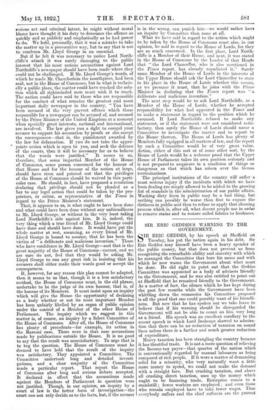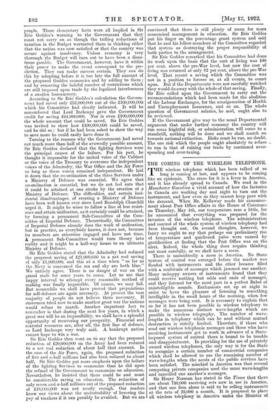SIR ERIC GEDDES'S WARNING TO THE GOVERNMENT.
SIR ERIC GEDDES, by his speech at Sheffield on Tuesday, has put the nation again in his debt. Sir Eric Geddes may himself have been a heavy spender of the public money, but that does not prevent us from recognizing the remarkable ability and sincerity with which he managed the Committee that bore his name and with which he now warns the Government about what must be done. He did right to point out that the Geddes Committee was appointed as a body of advisers friendly to the Government, and he was also entitled to point out at Sheffield that he remained friendly to the Government. As a matter of fact, the silence which he has kept during the past few months while the Government have been whittling down the economies his Committee proposed is all the proof that one could possibly want of his friendli- ness. But now that he has spoken out we take leave to believe that if his warning should be disregarded the Government will not be able to count on him very long as a friend. His speech was an excellent corollary to the recent speech in which Lord Inchcape showed to admira- tion that there can be no reduction of taxation on sound lines unless there is a further and much greater reduction of expenditure. Heavy taxation has been strangling the country because it has throttled trade. It is not a mere question of relieving the Income-tax payer—that quarter of the nation which is conventionally regarded by manual labourers as being composed of rich people. If it were a matter of demanding relief for a minority, who very naturally want a little more money to spend, we could not make the demand with a straight face. But crushing taxation, and above all crushing direct taxation, uses up the money which ought to be financing trade. Enterprise comes to a standstill ; fewer workers are employed ; and even those who remain employed have to take lower wages. Thus everybody suffers and the chief sufferers are the poorest people. These elementary facts were all implied in Sir Eric Geddes's warning to the Government that they must not carry on as though the trifling reductions of taxation in the Budget warranted them in thinking either that the nation was now satisfied or that the country was secure against insolvency. Unless economy is very thorough the Budget will turn out to have been a disas- trous gamble. The Government, however, have it within their power to make the event correspond to the pre- diction. They can make success certain. They can do this by adopting before it is too late the full amount of the proposed Geddes economics and by adding to them ; and by removing the baleful number of restrictions which are still imposed upon trade by the legalized interferences of a swollen bureaucracy. According to Sir Eric Geddes's calculation the Govern- ment had saved only £52,000,000 out of the £100,000,000 which his Committee had clearly indicated. It will be remembered that Lord Inchcape gave the Government credit for saving £64,000,000. Nor is even £100,000,000 the whole amount that could be saved. Sir Eric Geddes was invited to show how £100,000,000 could be saved, and he did so ; but if he had been asked to show the way to save more he could easily have done it.
Turning to the reasons why the Government had saved not much more than half of the avowedly possible amount, Sir Eric Geddes declared that the fighting Services were the principal causes of the failure. For his part, he thought it impossible for the united voice of the Cabinet or the voice of the Treasury to overcome the independent voices of the Admiralty, the War Office and the Air Force so long as these voices remained independent. He laid it down that the co-ordination of the three Services under a Ministry of Defence was essential. We agree that co-ordination is essential, but we do not feel sure that it could be attained at one stroke by the creation of a Ministry of Defence. The difficulties, and certain inci- dental disadvantages, of creating a Ministry of Defence have been well known ever since Lord Randolph Churchill urged it. It might be wiser to follow a line of less resist- ance and attain unification, as it certainly could be attained, by forming a permanent Sub-Committee of the Com- mittee of Imperial Defence. Theoretically, the Committee of Imperial Defence already does the work of unification, but in practice, as everybody knows, it does not, because its members are otherwise engaged and have not time. A permanent Sub-Committee would turn theory into reality and it might be a half-way house to an ultimate Ministry of Defence. Sir Eric Geddes stated that the Admiralty had reduced the proposed saving of £21,000,000 to a net real saving of only £4,000,000, and this at a time when " so far as the Navy is concerned the sea and sky are both blue." We entirely agree. There is no danger of war on the grand scale for some years to come. Let us use that happy interval to attempt every reasonable method of making war finally impossible. Of course, we may fail. But meanwhile we shall have proved that preparations for self-defence are again necessary. At present the vast majority of people do not believe them necessary. If statesmen tried now to make another great war the nations would refuse to march. Another important fact to remember is that during the next few years, in which a great war will be an impossibility, we shall have a splendid opportunity of recovering our prosperity. Financial and material resources are, after all, the first line of defence, as Lord Inchcape very truly said. A bankrupt nation cannot hope to win a war. Sir Eric Geddes then went on to say that the proposed reduction of £20,000,000 on the Army had been reduced to a net real reduction of about half that amount. In the case of the Air Force, again, the proposed reduction of five and a-half millions had also been reduced to about half. Sir Eric Geddes put more emphasis upon the failure of the fighting Services to economize than he did upon the refusal of the Government to economize on education. Nevertheless, he insisted that there could be and must be considerable saving on education. The reduction of only seven and a-half millions out of the proposed reduction of 118,000,000 was not nearly enough. Our readers know our views about the undesirability of lowering the pay of teachers if it can possibly be avoided. But we are convinced that there is still ' plenty of room for more economical management in education. Sir Eric Geddes put his finger on the percentage grant system and said that he and his fellow-members of the Committee regarded that system as destroying the proper responsibility of both parties to the arrangement.
Sir Eric Geddes remarked that his Committee had done its work upon the basis that the cost of living was 100 per cent. above the pre-War level, but now the cost of living:, was returned at only 82 per cent. above the pre-War level. That meant a saving which the Committee was not in a position to foresee or, at all events, to count upon. But if the Departments were not carefully watched they would do away with the whole of that saving. Finally, Sir Eric called upon the Government to carry out the recommendations which had been made for the abolition of the Labour Exchanges, for the amalgamation of Health and Unemployment Insurance, and so on. The whole question of Government salaries, he said, ought also to be reviewed.
If the Government give way to the usual Departmental argument that under further economy the country will run some frightful risk, or administration will come to a standstill, nothing will be done and we shall march on towards national extinction. Risks must be run, no doubt. The one risk which the people ought absolutely to refuse to run is that of ruining our trade by continued over- spending and over-taxing.



































 Previous page
Previous page